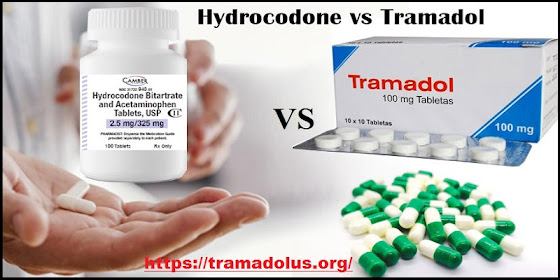Hydrocodone vs Tramadol: the difference between the two pain relievers
Hydrocodone vs Tramadol: the difference between the two pain relievers
Hydrocodone and Tramadol are both potent pain relievers. They belong to the category called opioid analgesics, often known as narcotics. These medications help treat moderate to severe pain. Doctors also prescribe them for the treatment of long-term pain resulting from cancer or other chronic conditions, or injury or surgery.
A physician will only prescribe these medicines when the treatment with non-opioid pain relievers, like acetaminophen and ibuprofen, did not help.
These drugs can have a significant impact on the brain. They both can be highly effective and, at the same time, very addictive. They work differently and also have their side effects.
How do they work?

Both medications work by binding to different receptors in the brain to change how the body feels and responds to the feeling of pain. Tramadol also let the serotonin and norepinephrine to stay available for a more extended period in the brain, which helps in blocking the pain signals in the spinal cord.
Main differences
Hydrocodone
Generic version – Not available
Brand name – Hysingla ER, Zohydro ER
Forms – Extended-release tablets
Strengths – 20mg to 120mg
Unique side effects
- Low blood pressure
- Gastric obstruction
- Confusion
- Respiratory depression
Tramadol
Generic version – Available
Brand name – Ultram, ConZip
Forms – Immediate-release tablets and extended-release tablets
Strengths – Immediate-release: 50mg; extended-release: 100mg, 150mg, 200mg, 300mg

Unique side effects
- Congestion
- Headache
- Weakness
- Itching
- seizures
- flushing
- sore throat
Side effects of Tramadol and Hydrocodone
Common side effects
- loss of appetite
- constipation
- nausea
- vomiting
- dizziness
- drowsiness
- congestion
- sore throat
- itching
- weakness
- headache
These effects usually fade away in a few days, but if they persist, then it would be better to consult a doctor before continuing the treatment.
Severe side effects
- respiratory depression
- mood problems
- confusion
- gastric obstruction
- hypersensitivity reactions
- low blood pressure
These symptoms require immediate medical attention and can be dangerous if not treated. If a person experiences any such effects after taking Tramadol or Hydrocodone, they should contact their doctor, or if the intensity of these symptoms is high, then they should call emergency services such as 911 at once.
What factors increase the risk of side effects?
Some people are at higher risk of experiencing side effects that others. The adverse effects of both Tramadol and Hydrocodone are more intense on older people. Those who have kidney or liver disease, chronic obstructive pulmonary disease, or other chronic diseases, can also feel severe side effects of these medications. Tramadol can also increase the risk of suicide in people with depression.
Interactions
Both Hydrocodone and Tramadol can interact with several medicines and other substances. People should inform their pharmacists and doctor before start using these medicines. Certain things, like alcohol and various over the counter drugs that result in sleepiness, including cold and cough formulas, can increase the sedating effects of these medications.
Warnings
As per the DEA (drug enforcement administration), Hydrocodone is more misused opioid than any other. Both these drugs can be addictive as the user can develop tolerance to either drug over an extended period of use.
When a person starts to build tolerance, the standard dosage will no longer have the same effect on them. These individuals tend to take more than the recommended dosage to feel the effects of these medicines. This increased tolerance can lead up to addiction.
If a person thinks that they are developing an addiction to these drugs, then they should consult with a doctor. It is also worth noting that they should not stop using either of these medicines abruptly, as that can result in withdrawal symptoms. To help prevent the withdrawal, the doctor will slowly decrease the dosage over time.
Which one to take?
One should let their doctor decide which among Tramadol and Hydrocodone will be best for them. But before the doctor prescribes either one of these opioid pain medications, it is crucial to discuss all the medical conditions that a person might have. They should also mention all the OTC and prescription medications and supplements that they are taking before starting to use this medicine. Also, tell the doctor about the problem with alcohol or substance abuse, if any.
It is also essential to discuss the side effects and benefits of these medications with the doctor and work together with the doctor to ensure the best possible outcome from the treatment.

Comments